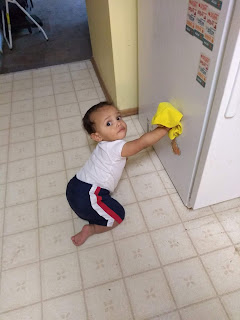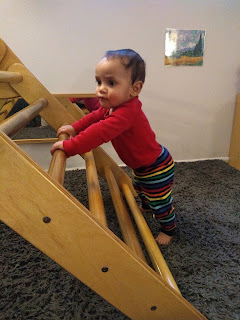Exposing Infants to a World of Language
I am a Montessori teacher for ages 3 to 6. Enter my (or any Montessori) classroom, and you might be surprised to hear all the vocabulary that the children use. A 5-year-old has mastered the map of Europe and can tell you the name of any country--Norway, Ukraine, Italy. A 3-year-old is beginning work with the geometric solids--sphere, cube, cylinder. A 4-year-old has learned all the parts of an insect--thorax, abdomen, forewings.
Why all the fancy language when so many sources of entertainment, and even education, for young children use simplified language? Dr. Maria Montessori observed the “absorbent mind” of the child ages 6 and under, meaning that they effortlessly absorb all the language around them like a sponge--so why not expose them to as much real language as possible?
From before birth, a child benefits from all the language she is exposed to. When I was pregnant I purchased CDs with songs in 9 different languages (from Michael Olaf) to expose Calvin not only to English, but to other languages. No, a child cannot pick up a language in utero, but just hearing the different sounds of another language will make it easier for the child to learn that language later on.
From birth, I have talked Calvin through our routines. Diaper changing, getting dressed, taking a bath, etc. A newborn does not know what you are saying, but with repetition babies quickly learn. Not only am I talking Calvin through these routines, but I am using real language. I ask Calvin if he has had a bowel movement. If he is sitting on his potty and urinates, I call it just that. “You put urine in your potty. Now let’s put the urine in the toilet.” When toileting and bathing, we also use correct terms for body parts. There are several reasons it is important, especially when referring to genitals, to use correct terms.
Calvin is 16 months old now and is very interested in hearing the names of things. Just now I was in his room with him and he was going around pointing to everything. Each thing he would point to, I would tell him the name. Many of the things he knows the name of already, but the repetition of hearing the name again helps the child who is mastering language. I do my best to give him the most accurate names of everything.
I do not remember the statistic I have heard, but I do know that the number of words in a young child’s vocabulary directly corresponds to his academic success his whole life long. I do wish that I knew the names of everything and could just walk down the road with Calvin, telling him the names of every type of tree and flower. What I can do, however, and what we all can do is read to our children. There are so many wonderful books for children now. I will write more about Montessori baby books in a later post, but I will say that books with real pictures that teach young children the names of things in the real world are an excellent substitute for knowing everything ourselves. I just bought Calvin a beautiful book that has the names of several leaves (A Pile of Leaves by Jason Fulford and Tamara Shopsin). I don’t need to know everything to be able to expose Calvin to endless language. Added bonus: I’m learning new things, too!







Comments
Post a Comment